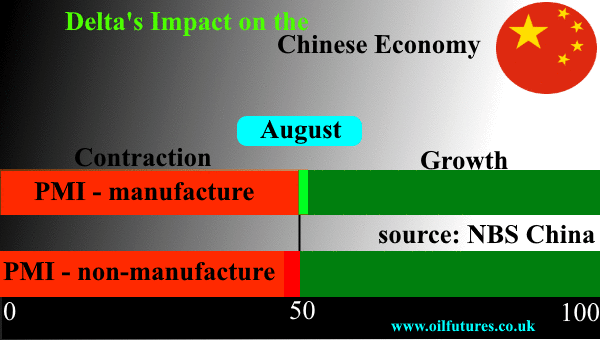Although China managed to control the outbreaks of
the Delta variant of the Covid-19, it could not mitigate the impact on the
economy during the period from July to August.
The latest data from the National Bureau of
Statistics of China, released on the eve of the latest OPEC+ meeting, clearly shows the manufacturing activity picked up at a
very slow rate in August – for the fifth month in a row.
Chinese economists blamed it on two factors: the
unexpected outbreaks of the Delta variant in major Chinese cities that resulted
in them being in long lockdown; the rise in raw materials, exacerbated by the
increasing crude oil prices.
China uses PMI, Purchasing Manager’s Index – along with
other universal measures – to gauge its economic activities, with 50-point-mark
demarcating the border between the growth and contraction.
The PMI for the manufacturing sector in August was
just 50.1, a drop of 0.3 points from that in July. The PMI for
non-manufacturing sector, meanwhile, recorded 47.5 – below the 50-point-mark
for the first time since February, 2020; according to this scale, it was a
contraction, indeed.
The Delta variant broke out in the world’s second
largest economy during one of its busiest period of the calendar for the non-manufacturing
sector such as hotels and tourism industries – the summer.
The subdued economic activities had a direct impact
on the Chinese imports of the crude oil. With less traffic on the roads, the
demand plummeted, although there was no significant impact on the price at the
pumps.
In order to mitigate the impact on the fragile
economic recovery, China turned to SPR, Strategic Petroleum Reserves, as did many
key players in the region as a last resort.
At present, the members of the Joint Technical Committee
of the OPEC+, JTC, are meeting, before the scheduled meeting of the minsters on
Wednesday.
They have already expressed concerns about demand
for this year and the next year, while taking into account the impact of the
Delta variant on the crude oil markets in major oil importing countries such as
China, India, Japan and South Korea.
It certainly will be grim reading for the ministers
tomorrow as well as for the investors and traders.
Since the OPEC+ is under pressure to increase the
production by much more than they already agreed to, analysts are keenly
awaiting the final outcome of tomorrow in light of the developments.
If there is no prospect of a sharp increase in crude
oil output in the offing, there is a possibility of someone from the US administration
making yet another phone call to the top echelons of the OPEC+ on Wednesday, as
happened in April, 2021, substance of which usually remains shielded from the
mere mortals.








